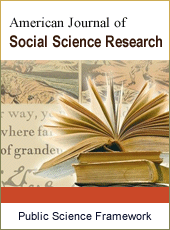American Journal of Social Science Research
Articles Information
American Journal of Social Science Research, Vol.1, No.3, Aug. 2015, Pub. Date: Jun. 24, 2015
Investigating the Relationship Between Personality Traits of Administrators and Teachers' Empowerment (Case Study: Public Schools of JAVADABAD)
Pages: 141-146 Views: 5150 Downloads: 1466
[01]
Hadi Rezghi Shirsavar, Department of Educational Management, College of Education and Psychology, GARMSAR Branch, Islamic Azad University, Garmsar, Iran.
[02]
Jafar Mansorikhah, Department of Educational Management, College of Education and Psychology, GARMSAR Branch, Islamic Azad University, Garmsar, Iran.
This study aimed to investigate the relationship between personality traits of administrators (extraversion, agreeableness, conscientiousness, emotional stability, and openness to experience) and teachers' empowerment. To achieve this objective, a descriptive research in correlational type has been used. The statistical population of this research includes all teachers and administrators in public schools of JAVADABAD. In this study, a five factor model of personality and a 49-item questionnaire to measure empowerment of teachers have been used to assess personality traits of administrators and the teachers' empowerment, respectively. The research hypotheses test has been done using SPSS and LISREL software. The results show that in general there is no significant relationship between personality traits of administrators and teachers' empowerment, and among the 5 dimensions of personality, there is only significant relationship between the characteristic of administrators' agreeableness and teachers' empowerment. The results suggested a way to improve knowledge and skills of teachers a top priority administrator consider. In addition, the performance of teachers affected by the performance of the executive directors, so it is necessary to improve their yield towering notice.
Personality Traits, Five Factor Model of Personality, Teacher Empowerment
[01]
Alagheband, A., Theoretical Foundations and Principles of Educational Management, 5thedition, Tehran, Ravan Publisher, 2008.
[02]
Aghayar, S., Empowerment a new approach in a competitive environment, Journal of Tadbir, no. 135, p. 28, 2003.
[03]
Rezaeian, A., Principles of Organizational Behavior Management, Tehran, Samt Publishers, 2000.
[04]
Robbins, Stephen P., Foundations of Organizational Behavior, translated by Mehdi Zare, Tehran, Negahe No Publishers, 2010.
[05]
Razavi, H., The impact of administrators' intelligence on employees' empowerment, Master, Tehran University, Tehran, 2006.
[06]
Mohsenin, Sh., Structural Equation Modeling (educational and applied) with the help ofLISREL software, Tehran, Mehraban Publishers, 2013.
[07]
Robbins ،T.L, Crino, M.D and Fredendall, L.D, “An integrative model of the empowerment process”, Human Resource Management Review, vol.12,no. 1،pp.419-443,2002.
[08]
Thomas،K.W and Velthouse، B.A, “Cognitive elements of empowerment: an interpretive model of intrinsic task motivation”, Academy of ManagementReview, vol.15, pp.666-681, 1990.
[09]
Spreitzer, G.M.“Psychological Empowerment in the workplace: Dimensions, Measurement and validation”, The Academy of Management Journal, vol. 38, no. 5, pp. 1442-1465, 1995.
[10]
Gill, A., Fitzgerald, S., Bhutani, S., Mand, H., & Sharma, S. (2011). “The relationship between transformational leadership and employee desire for empowerment”, International Journal of Contemporary Hospitality Management,Vol 22, No 2, pp 263-273.
[11]
Voget, J.F. & Murrel،K.L.(1990)، “Empowerment in organization: how to spark exceptional performance”. University Associates،San Diego،CA.

ISSN Print: 2381-7712
ISSN Online: 2381-7720
Current Issue:
Vol. 7, Issue 3, September Submit a Manuscript Join Editorial Board Join Reviewer Team
ISSN Online: 2381-7720
Current Issue:
Vol. 7, Issue 3, September Submit a Manuscript Join Editorial Board Join Reviewer Team
| About This Journal |
| All Issues |
| Open Access |
| Indexing |
| Payment Information |
| Author Guidelines |
| Review Process |
| Publication Ethics |
| Editorial Board |
| Peer Reviewers |


